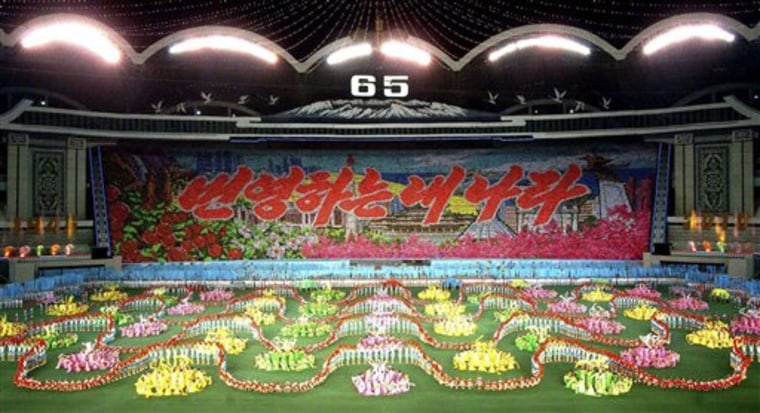North Korea threatened to retaliate against South Korea over its planned naval drills near the sea border as Pyongyang opened this year's massive dance and gymnastics performance known as the Arirang Festival.
Named after a traditional Korean love song, the show typically features thousands of gymnasts in synchronized maneuvers and giant mosaics formed by children turning pieces of colored paper. Versions of the mass games have been staged in 2002, 2005, 2007, 2008, and 2009.
The festival came as the United States seeks to cut off North Korea's illicit moneymaking sources by freezing the assets of those who help the regime fund its nuclear weapons program.
The U.S. measures will pinpoint "illicit and deceptive" activities such as drug trafficking, currency counterfeiting and the banned trade in conventional arms, Robert Einhorn, the State Department's special adviser for nonproliferation and arms control, said in Seoul on Monday.
Naval threat
The North's official Korean Central News Agency said that the military would crush the naval drills with a powerful physical blow and warned all civilian ships to stay away from areas near the sea border.
South Korea plans to hold five-day naval drills in the Yellow sea, including near the border, beginning Thursday in response to the March sinking of a South Korean warship blamed on North Korea.
North Korea vehemently denies involvement in the sinking of the 1,200-ton Cheonan, and has demanded that its own investigators be allowed to visit to South Korea to examine the results. Seoul has rejected the North's repeated requests.
The North's military denounced South Korea's planned drills as political provocations aimed at keeping the current sea border — the scene of deadly skirmishes between the two sides in 1999, 2002 and last year.
South Korea's Defense Ministry officials were not immediately available for comment.
The western maritime boundary has long been considered a flash point between the two Koreas because the North does not recognize a line the United Nations unilaterally drew at the end of the 1950-53 Korean War.
Last month, South Korea and the United States held naval drills in the East Sea off the coast of the Korean peninsula to warn the North that further provocations will not be tolerated.
The North had threatened to respond to the joint military exercises with powerful nuclear deterrence, though there was no sign of unusual North Korean military activity during the drills.
Pyongyang routinely accuses the U.S. and South Korea of staging the military drills as a rehearsal for an attack on North Korea. Washington and Seoul say the exercises are purely defensive and that they have no intention of invading the North.
Festival spectacle
Senior North Korean officials, including Yang Hyong Sop, vice president of the Presidium of the Supreme People's Assembly, watched the opening performance at Pyongyang's May Day Stadium on Monday evening, according to the KCNA. The festival will run through to Oct. 10.
KCNA said spectators were mesmerized by performers who presented dynamic gymnastic movements, beautiful music, elegant dances, ever-changing background scenes and gorgeous electronic displays.
"It's very great, really great, fantastic theater here and performing is perfect. That's one of the best things in North Korea I have seen," Andreas Heckes, a German tourist told international TV news agency APTN.
Kim Yong-hyun, a professor of North Korean affairs at Seoul's Dongguk University, said the festival is aimed at solidifying the North's internal unity.
The festival made its debut in 2002 to commemorate the birth of the North's late founding leader Kim Il Sung, father of the North's current leader Kim Jong Il.
It has been criticized as a propaganda tool achieved through the rigid and disciplined training of its young performers.
Over the years, the festival has attracted more than 12 million people, including 118,000 foreigners, according to a recent report of the North's Rodong Sinmun newspaper.
In 2000, Kim Jong Il took visiting then U.S. Secretary of State Madeleine Albright to a mass performance that was a precursor to the Arirang show, the highlight of which was a giant mosaic displaying a rocket flying into the sky.
